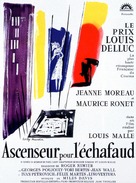Reviews provided by RottenTomatoes
Marta Barber, Miami Herald: Elevator to the Gallows is a treat for the film buff. Watching Moreau and Malle as they discover each other and a new trend in filmmaking, and listening to Miles Davis during their quest will remind you of what movies are all about. Read more
Jonathan Rosenbaum, Chicago Reader: Efficient but soulless. Read more
Steve Murray, Atlanta Journal-Constitution: The movie's most compelling element of all is Moreau, wandering the nighttime streets trying to find her lover. It's as if she's blown from one cafe to the next on a blended wind of passion, dread and the lonely trumpet wail. Read more
Wesley Morris, Boston Globe: The tasty 1957 noir thriller that introduced the world to French filmmaker Louis Malle, who at the time was a 24-year-old assistant director for Jacques Cousteau. Read more
Kenneth Turan, Los Angeles Times: A consummate entertainment rich with the romantic atmosphere of Paris in the 1950s. Read more
Michael Booth, Denver Post: The plot crackles with energy and misdirection, while the black-and-white film sharpens angles and amplifies the shadows lurking in every hallway. Read more
Chris Vognar, Dallas Morning News: Henri Decae's black-and-white cinematography brings out the melancholy mystery of Paris' boulevards and cafes, and Ms. Moreau, shot with natural lighting and without make-up, is like a mournful goddess of glamour. Read more
Ella Taylor, L.A. Weekly: What makes this swooningly atmospheric movie a true romance is the face of Jeanne Moreau in close-up, at once impassive, devious and tragic as she wanders the rain-soaked streets of nighttime Paris. Read more
Jan Stuart, Newsday: If you've never seen this 1957 film-noir gem, you should be seduced by the cool nocturnal cinematography of Henri Decae and the languid improvisational sounds of Miles Davis. Read more
Andrew Sarris, New York Observer: Don't miss this opportunity to see the movie that launched the legend of Jeanne Moreau. Read more
Roger Ebert, Chicago Sun-Times: These 1950s French noirs abandon the formality of traditional crime films, the almost ritualistic obedience to formula, and show crazy stuff happening to people who seem to be making up their lives as they go along. Read more
Walter V. Addiego, San Francisco Chronicle: As French crime thrillers go, this is about as good as it gets. It's also an important film historically, and to top it off, the jazz score, by Miles Davis, is famous in its own right. Read more
Colin Covert, Minneapolis Star Tribune: A suspense thriller with a tense, jazzy score and a rich undercurrent of fatalistic irony. Read more
Melissa Anderson, Village Voice: It's precisely Malle's omnivorous appetite that makes his first feature, adapted from a policier, so delectable, one stuffed with many sumptuous sights and sounds. Read more
Stephen Hunter, Washington Post: What turns it fabulous, indeed mythical, is the presence of another entity: Paris at night in the '50s, to the tune of Miles Davis's score as realized in the dappled hues of Henri Decae's gorgeous poetic cinematography. Read more

